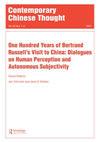意识形态正统、国家学说还是治理艺术?当代中国学术中的“儒学胜利”再探
IF 0.4
3区 哲学
0 ASIAN STUDIES
引用次数: 4
摘要
摘要在英、日、中学界,“儒学的胜利”发生在汉代一直是一种流行的理论。这些学术团体的一些成员对这一理论提出了质疑。然而,长期以来被忽视的是,它们是通过采用不同的术语和研究框架来做到这一点的。英语学者使用“儒家的胜利/胜利”来指代儒家在那个时期的主导地位或发展,而日本人使用“建立儒家学说/宗教作为国家学说/宗教”(jukyo kokkyoka),中国人使用“摒弃百家,只尊崇儒家艺术”(ba chu bai jia du zun ru shu,)。正如本期所阐述的,这些表述体现了研究汉代儒学历史的三种不同方式。本文章由计算机程序翻译,如有差异,请以英文原文为准。
Ideological Orthodoxy, State Doctrine, or Art of Governance? The “Victory of Confucianism” Revisited in Contemporary Chinese Scholarship
Abstract It has been a popular theory in English, Japanese, and Chinese scholarship that a “victory of Confucianism” occurred during the Han dynasty. Some members of these academic communities challenge this theory. However, it has long been overlooked that they do so by adopting different terminology and research frameworks. English scholarship uses the expression “victory/triumph of Confucianism” to refer to the dominance or growth of Confucianism during that period, while the Japanese use “the establishment of Confucian doctrine/religion as the state doctrine/religion” (jukyo kokkyoka 儒教國教化) and the Chinese use “dismissing the hundred schools and revering only the Confucian arts” (ba chu bai jia du zun ru shu 罷黜百家, 獨尊儒術). The expressions, as the current issue illustrates, exemplify three different ways of studying the history of Han Confucianism.
求助全文
通过发布文献求助,成功后即可免费获取论文全文。
去求助
来源期刊

CONTEMPORARY CHINESE THOUGHT
Multiple-
CiteScore
0.10
自引率
0.00%
发文量
0
期刊介绍:
This wide ranging journal is essential reading for anyone who wants to understand the diverse themes and influences that shape Chinese thought today. It features translations of the most current and influential Chinese writings on all aspects of philosophical endeavor, from theoretical essays on systems to studies of China"s cultural and religious development, from interpretations of the Chinese classics to exegeses on Marxist thought.
 求助内容:
求助内容: 应助结果提醒方式:
应助结果提醒方式:


